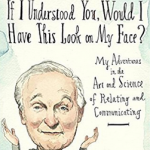 By Jeanne Yocum
By Jeanne Yocum
Let me make this clear from the get-go: I believe Alan Alda’s new book, If I Understood You, Would I Have This Look on My Face?, is one of the most important books any small business owner will ever read. Yes, I can hear you asking, “How could a book by an actor help my business?” The book’s subtitle helps answer that; it’s My Adventures in the Art and Science of Relating and Communicating.
Being able to communicate effectively with employees, customers and potential customers, vendors, and professional colleagues can be the difference between success and failure for a small business. The advice on this topic that Alda offers is probably the best I’ve ever read. What you learn in these pages will help you communicate better in every aspect of your life, including in your business.
If you often leave a face-to-face meeting with a prospective client wondering why they weren’t more excited about your product or service, this is the book for you. If you often feel that your employees “just don’t get it” and lack motivation, this is the book for you. If you meet with your accountant or lawyer and you don’t really understand the important information they share with you, then this is a book you need to tell that person about.
Much more than a book of tips
Forget the notion that Alda is “just an actor.” A life-long science geek and host of the award-winning TV series “Scientific American Frontiers” for 11 years, he founded the Alan Alda Center for Communicating Science at Stony Brook University, where he sometimes teaches. In this highly engaging book, he combines findings from recent scientific studies with his own experiences with improv techniques, theater and story telling to provide valuable insights into how we call can become better at communicating. This is much more than a book of tips about how to communicate better; it thoroughly explains the fundamental components of good communication and the science behind good communication.
Here are just a few nuggets from the book that I hope will give you a flavor for what you’ll learn in these pages:
-From the introduction: “But as we [at the Alan Alda Center] helped scientists be clear to the rest of us, I realized we were teaching something so fundamental to communication that it affects not just how scientists communicate, but the way all of us relate to one another. We were developing empathy and the ability to be aware of what was happening in the mind of another person. This, we realized, is the key, the fundamental ingredient without which real communication can’t happen. Developing empathy and learning to recognize what the other person is thinking are both essential to good communication, and are what this book is about.”
-From Chapter 4, which is about an improvisational theater technique that helps people learn to relate better to the person they’re communicating with: “If I’m trying to explain something and you don’t follow me, it’s not simply your job to catch up. It’s my job to slow down. This is the heart of communicating: If I tell you something without making sure you get it, did I really communicate anything? Was I talking to you, or was I just making noises?”
-From Chapter 8, which is about team building, specifically the work of Uri Alon, an Israeli scientist who works to make teams smarter and more collaborative: “The responsibility really belongs to the person speaking, not the person listening. And now Uri was taking it a step further, suggesting that you can move a whole group to greater motivation. ‘The goal,’ he was saying, ‘is to provide people with the conditions that enhance their natural self-motivated behavior.’”
-From Chapter 18, which is about the value of story telling: “When scientists need funding, or a business needs to capture the imagination of the public, or a parent just wants to impart wisdom to a child, it seems to me that the most vivid way to do it is with a good, dramatic story.”
-From Chapter 20, which is about our over-reliance on jargon: “Once we know something, it’s hard to unknown it, to remember what it is like to be a beginner. It keeps us from considering the listener. Using shorthand that is incomprehensible to the other person, or referring to a process they’re unfamiliar with, we lock them out, and we don’t even realize it because we can’t believe we are the only person who knows this stuff.”
At just under 200 pages, Alda’s book is a quick read. But it’s a highly meaningful read that has the potential to significantly improve the job you do in running a small business.
